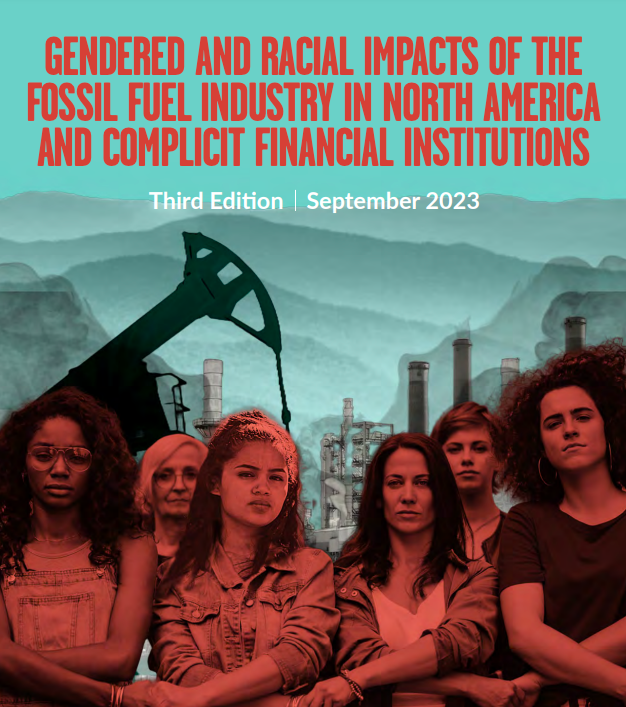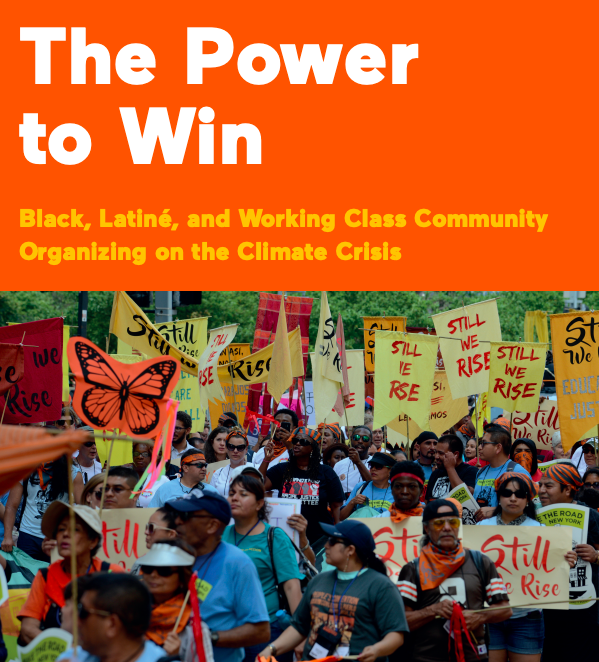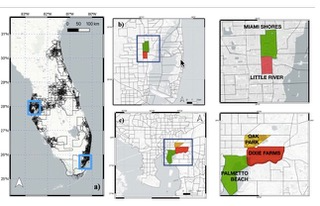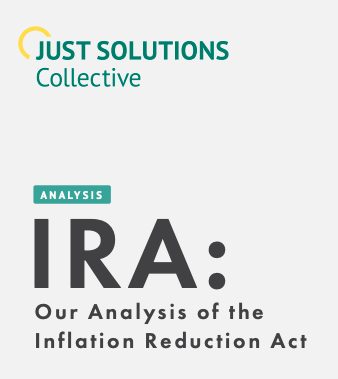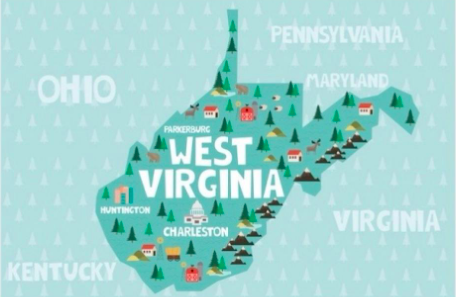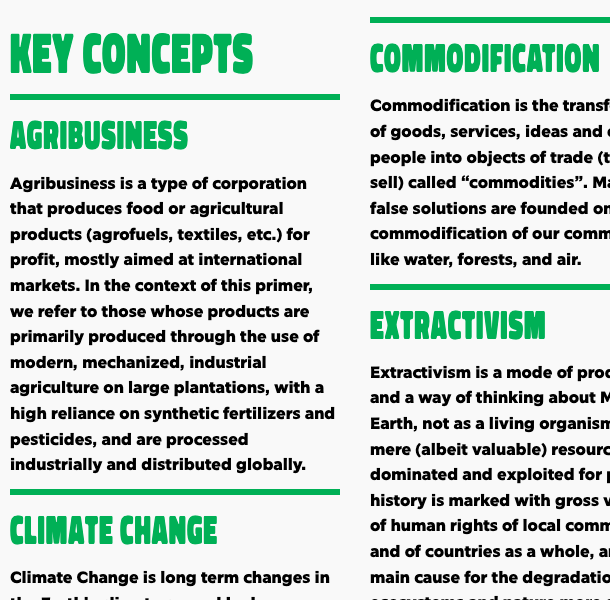Resources
Search below for resources covering the intersection of climate engagement, social science and data analytics.
RESULTS
Gendered and Racial Impacts of the Fossil Fuel Industry in North America and Complicit Financial Institutions
This report finds an indisputable connection between the fossil fuel industry’s practices and negative impacts to African American/Black/ African Diaspora, Indigenous, Latina/Chicana, and low-income women’s health, safety, and human rights in the U.S. and parts of Canada. Specifically, fossil fuel-derived air, water, and soil pollution impact women’s fertility, mental health, and daily work and responsibilities. The negative effects from fossil fuel activity—including extraction, storage and transportation of coal, oil, and gas often in the form of liquefied natural gas (LNG)—stem from direct pollution of communities by fossil fuel companies’ contributions to industrial carbon dioxide and methane. The climate crisis does not and will not affect everyone equally, as factors such as gender, race, and socio-economic status make certain communities significantly more vulnerable to the increasing threats of climate change. Global inequalities, rooted in structural patriarchy, colonialism, white supremacy, and capitalism, continue to place people of the global majority, and specifically women, at risk.
Deep Canvassing Lessons Learned with Kentuckians for the Commonwealth
Join Kentuckians for the Commonwealth to learn more about their deep canvassing efforts, lessons learned, and best practices from their on-the-ground experience. During this webinar, participants will hear from the folks involved about how deep canvassing can be a powerful tool for bringing new people into the climate justice movement as well as how learnings might be applied to other climate deep canvass and relational conversation programs across the country.
The Power to Win: Black, Latiné, and Working Class Community Organizing on the Climate Crisis
Organizing the climate crisis’ most disproportionately impacted communities is the missing ingredient to build power required to address the climate crisis. In order to meet the climate crisis and transform our society, we must scale up grassroots organizing. Organizations affiliated with the Center for Popular Democracy that are now leading some of the strongest climate justice organizing in the country include the Green New Deal Network, New York Communities for Change, Make the Road PA, One PA, CASA, the PA statewide climate table, and Florida Rising, and others. This report profiles the work of those groups and others organizing working-class communities of color into the climate movement. Organizing must be: 1) community-led and focus on issues that have tangible impacts for Black, Indigenous, Latiné, and low-income people, 2) rooted in a framework that challenges racial capitalism, and 3) intersect with other issues impacting frontline communities.
Climate Deep Canvassing Report
Kentuckians for the Commonwealth ran a Climate Crisis Deep Canvassing Project in Louisville, Bowling Green, and Hazard, Kentucky where they knocked on thousands of doors and had more than 600 conversations with low-income communities and communities of color. They developed a written report that synthesizes the lessons, themes, and best practices from their on-the-ground experience to inform future canvassing trainings and program design.
Supported by the Climate Advocacy Lab's Climate Justice Microgrant Program.
Measuring, mapping, and anticipating climate gentrification in Florida: Miami and Tampa case studies
Recognize the disruptive potential of climate gentrification. This study looks at the current and potential impact of climate gentrification on low- and middle-income renters in Miami and Tampa, as areas away from the immediate coast become more desirable due to a growing awareness of climate risks. The authors have created a Climate Gentrification Risk Index to help local officials identify areas vulnerable to climate gentrification and plan for long-term land use changes.
IRA: Our Analysis of the Inflation Reduction Act
The Inflation Reduction Act (IRA) will invest $40 billion total, including $27 billion in direct spending, towards environmental justice communities and low-income residents—despite supporters claiming that the amount is $60 billion. Just Solutions Collective performed its own section-by-section analysis of the IRA’s text, adding up appropriations and other tailored spending to produce its own calculation. In total, the IRA includes $228 billion in appropriations and an additional $324 billion in tax expenditures. Direct appropriations in the IRA for environment, climate, and energy total $145 billion. This is dwarfed by the $270 billion provided in energy-related tax expenditures, through a variety of tax credits intended to incentivize primarily the private sector to invest in different aspects of the alternative energy economy: from mining companies extracting lithium to factories manufacturing inverters to refineries making biomass-based jet fuel to utilities installing solar arrays.
Building long-lasting grassroots power requires centering concrete issues and the humanity of individuals you’re organizing. Many organizations in West Virginia are cultivating organizers, building organizations that can sustainably organize local communities according to their needs for years to come, incorporating mutual aid, and more, in an effort to win and wield political power. In this article, The Forge contributor Mat Hanson discussed organizational strategies with multiple people involved in grassroots power building in West Virginia: Katey Lauer, co-chair of West Virginia Can’t Wait; Nicole McCormick, a founding member of the West Virginia United caucus and rank-and-file leader in the successful teacher’s strike; Dr. Shanequa Smith of Restorative Actions and the Black Voters Impact Initiative; and Joe Solomon, the co-founder and co-director of Solutions Oriented Addiction Response (SOAR), a volunteer-based organization that advocates for harm-reduction strategies to the opioid crisis.
Peasant Agroecology Achieves Climate Justice
“People’s rights” hold the true solutions to climate injustice. This resource argues that we need a transformation of the food system, where power, resources, and responsibility is redistributed from the elites to the producers and consumers, who are the ones who can most significantly contribute to solving the climate crisis. The central idea of “peasant agroecology” builds communities, conserves biodiversity, is based on science, builds autonomy, and involves revolutionary grassroots resistance—both via political organizing and grassroots economic ownership that is at odds with current models of global capitalism.
Why Intersectional Stories Are Key to Helping the Communities We Serve
Many people communicating for social change are exploring how to tell diverse and inclusive stories that center marginalized communities while building understanding about how inequality persists. Intersectionality is an important tool to help us tell great stories that help us understand systemic issues. Five guiding principles to telling intersectional stories: Show, don’t tell; Provide historical context; Uplift the voices of marginalized people; Tell whole stories; and, Radically reimagine the world.
Implementing the Portland Clean Energy Fund: Challenges and Opportunities
In 2018, the Portland Clean Energy Fund (PCEF) campaign secured a landslide ballot measure victory in Portland, establishing a multi-million dollar municipal fund that addresses climate, economic, and racial justice by providing funding for renewable energy projects, job training and apprenticeship programs, and regenerative agriculture. Last year, we got to look “under the hood” with PCEF Steering Committee members to cover the history of the campaign, what PCEF does, and how the community-led coalition was able to win at the ballot box.
In a follow-up webinar, we came back together to share new developments on the victory and cover topics including:
- How has PCEF been implemented, and how is it helping the community build political power?
- What lessons have been learned since winning the legislation, and what challenges and insights does that bring?
- What would it take to replicate this winning model in your own context and municipality?
Pagination
- Page 1
- Next page
